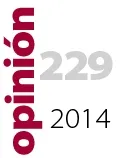On the Kremlin’s Disinformation (Russian version included)

Carmen Claudín
Senior Research Fellow, CIDOB
March 19, 2014 / Opinión CIDOB, n.º 229/ E-ISSN 2014-0843
This article was published in El País on 9 March 2014. It is translated from Spanish by Tom Hardy, and republished by kind permission.
“Russia, protect us from genocide”, pleads the placard of an elderly woman standing in front of the Crimean parliament. “No to fascism in Ukraine”, proclaims a demonstrator in Moscow. However, not one act of aggression against a Ukrainian citizen for the fact of being a Russian-speaker has been registered since the crisis began. Not even the Russian press has been able to dig up any evidence of one. Thus, if you cannot demonstrate the existence of abuse, you have to create the mass perception that it may well happen and must be avoided. That is what the Kremlin has done among the Russian-speaking population in Crimea and the eastern regions of Ukraine, and it is the argument that it uses when justifying its actions to its own society.
The Kremlin’s strategists have managed to roll out a programme of disinformation that is gaining traction even in the media and public opinion of other parts of the world, Spain included. The three mantras of this strategy are: fascists and radical extremists have carried out a coup d’état, toppling a legitimate president; this was achieved thanks to western interference; and the rights, not to mention the physical safety, of Russian-speaking minorities are at risk.
The dissolution of the Soviet Union left more than twenty million ethnic Russians within the borders of new independent states who then became citizens of those countries. Since then, Moscow has considered all Russian speakers to be its compatriots and the Constitution states that “the Russian Federation shall guarantee to its citizens protection and patronage abroad” as also asserts Russia’s Foreign Policy Concept of February 2013. That is why, in the case of Crimea, the Kremlin has diligently issued large numbers of Russian passports, ensuring that its compatriots become its legal citizens. The logic of this approach (where my compatriots are I am within my rights) allows them to activate, at their convenience, a mechanism founded on what Moscow defines as its “legitimate interests”.
The Russian language, which is also used by a large number of citizens who define themselves as Ukrainian, has never really been under threat in Ukraine. Anyone who walks the streets of Kyiv, or even Lviv, who buys a newspaper from a stand or enters a bookshop sees it and hears it. That is why the only glaring error so far committed by the interim government was the derogation of the 2012 law concerning the Russian language, a decision that has, fortunately, been reversed.
In the political plurality of Maidan, which encompasses the extremes of left and right, Moscow has made the ultranationalist party, Svoboda, and the other far-right groups the only protagonists, as if they were really dominating the current political agenda. It ignores, by contrast, and among other things, Yanukovych’s paramilitaries (the titushky), the composition of the interim government and that of the parliament, where these forces are in a minority. In fact, it is Russia’s current policy that is reinforcing the chauvinist Ukrainian right wing, with Moscow gifting them compelling arguments.
In Ukraine, the identification with a language or a national provenance is not necessarily a predictor of voting preference. This bothers the Kremlin in the run-up to the coming elections. In Ukraine, as in the majority of post-Soviet states, Russian, Russian-speaking, and pro-Russia are three distinct realities that sometimes coincide, but often do not. What is under debate now is the model of governance that Ukrainian citizens will choose. As much as the Russian media and leadership may repeat it, the division in the country is neither ethnic nor linguistic, it is political.